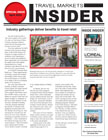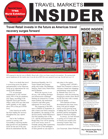Following on last week’s report of the 2014 UNWTO World Tourism Barometer, travel and expenditures from traditional source markets picked up last year.
This growth compensated for the slowdown of the large emerging markets, which had been driving tourism growth in previous years, said the World Tourism Barometer.
The agency estimates that the total number of trips abroad from China increased by 11 million to 109 million in 2014. Expenditure was up by 17% in the first three quarters of 2014, a strong result but slower than in previous years (40% in 2012 and 26% in 2013, respectively). China is the world’s largest outbound market since 2012 with a total expenditure of US$ 129 billion in 2013.
Among the other two main emerging markets, the Russian Federation (-6%) clearly lost strength in 2014, while Brazil still grew by 2%, despite the appreciation of the US dollar against the Brazilian real and slower economic growth. Beyond the top ten, some smaller emerging markets saw expenditure grow substantially, with Saudi Arabia, India, the Philippines and Qatar all reporting increases of 30% or over.
A pickup in demand from traditional source markets compensated for the slowdown of the large emerging markets. Expenditure from the United States, the second largest outbound market in the world, grew by 6%. Noteworthy is also the rebound of France (+11%), Italy (+6%) and the United Kingdom (+4%).
“We expect demand to continue growing in 2015 as the global economic situation improves even though there are still plenty of challenges ahead,” commented UNWTO Secretary-General, Taleb Rifai. He cited the decline in oil prices and lower transport costs that could boost economic growth by lifting purchasing power and private demand in oil importing economies, but could negatively impact the tourists of oil exporting countries.
According to 300 tourism experts consulted worldwide for the UNWTO Confidence Index, tourism performance is expected to improve in 2015, though expectations are less upbeat than a year ago.










